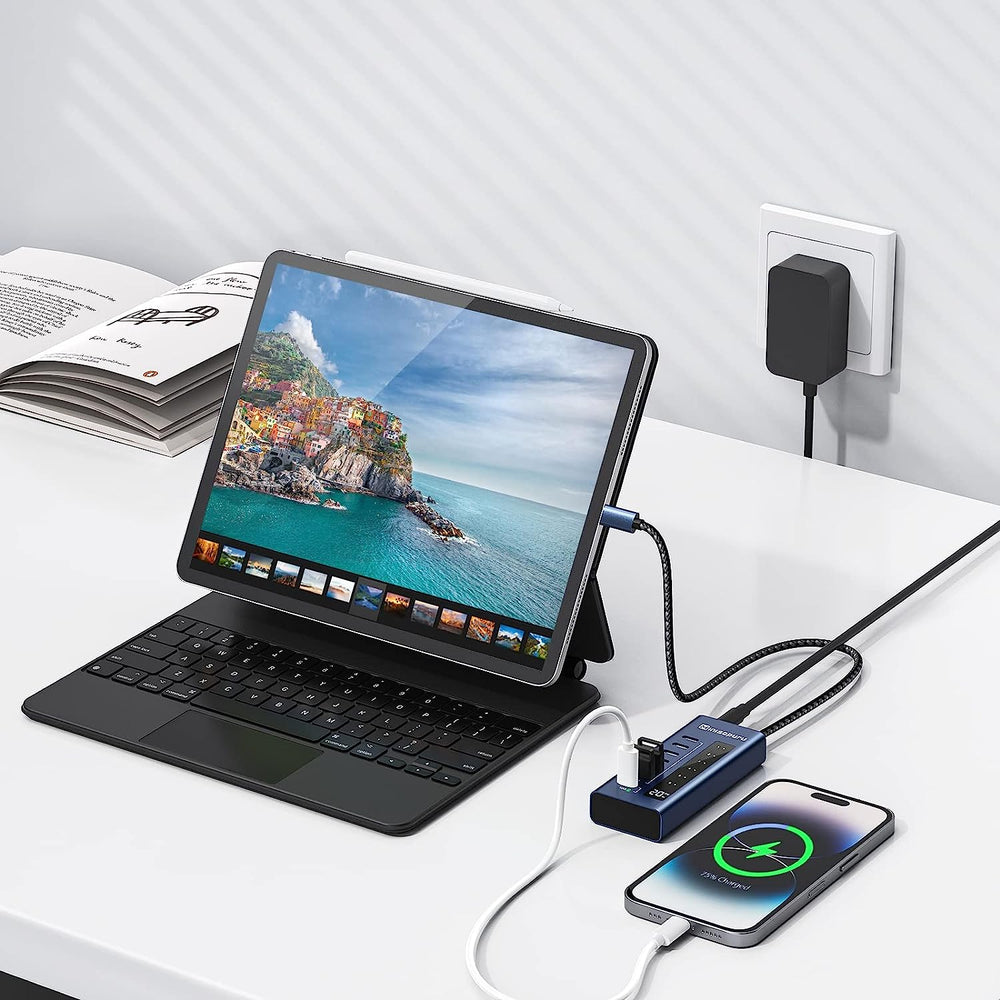Thunderbolt 4 interface
The Thunderbolt interface is jointly developed and customized by Intel and Apple. It integrates PCIExpress data transmission technology and DisplayPort display technology. It can transmit data, connect to external monitors, and charge external devices.
Among them, Thunderbolt 3 has an ultra-high-speed data transmission rate of up to 40Gbps; as a video output interface external monitor, it can connect two 4K/60Hz monitors, one 5K/60Hz or one 4K/120Hz monitor, bringing a higher-definition audio-visual experience; Thunderbolt 3 interface can also charge external devices such as laptops, mobile phones, and tablets, with a maximum power supply capacity of up to 100W.
Thunderbolt 4 is an iterative version of Thunderbolt 3, which has made some improvements based on Thunderbolt 3.
- ① Video. When connected to a monitor, it can support two 4K displays or one 8K display at the same time.
- ② Data. When connecting to an external graphics card, hard disk, etc., the minimum PCI-E transmission speed is increased from 16Gbps to 32Gbps, and when connecting to a storage device, the speed can reach 32GB/s, further narrowing the difference with direct connection to the motherboard.
- ③ Expansion. Supports 4-port docking stations and data cables up to 2 meters long. One cable can expand 3 Thunderbolt 4 interfaces, allowing more devices to be connected at one time.
- ④ Charging. Computers equipped with Thunderbolt 4 interfaces must have at least one interface that can charge the device.
- ⑤ Wake up. After connecting to the docking station, you can wake up the computer from sleep by touching the keyboard or mouse.


If you want to experience the powerful performance of the Thunderbolt interface, in addition to choosing products equipped with this interface, you can also choose another powerful interface USB4, which has equally good performance.
USB4 interface
The USB4 specification uses dual-link channels, with two versions, 20Gbps and 40Gbps. The latest upgraded version can reach a transmission rate of 80Gbps; USB4 supports DisplayPort 2.0 in Alt mode; supports external 8K/60Hz monitors; and supports 100W USB PD fast charging in terms of charging performance.
Overall, whether in terms of charging or data transmission, the performance of USB4 and Thunderbolt 3 is the same. USB4 can be said to integrate Thunderbolt 3 and is backward compatible with USB3.0 and 2.0.

Differences in interfaces
So what is the difference between USB4 and Thunderbolt 4?
First of all, the appearance of Thunderbolt 3, Thunderbolt 4 and USB4 interfaces are all Type-C style, but they have differences in function.
It should be emphasized that Type-C is just an interface standard. Compared with the previous USB interface, it is thinner, reversible and more extensible. Thunderbolt 3, Thunderbolt 4 and USB4 are different protocols, and the functions they can achieve are also different.
We have previously updated the 4 major features and functions of the Type-C interface. If you are interested, you can click on the picture below to review it.
The difference between the two is that the USB4 interface has a wider range of versatility and lower equipment requirements. In addition, USB4 is a free protocol that can be used by anyone, so the performance of products from various manufacturers is inevitably uneven.
The performance "lower limit" of the Thunderbolt 4 interface has been greatly improved compared to USB4. It has more stringent product functions, verification tests, and certification requirements, so devices that support Thunderbolt 4 have a better experience. It can be said that Thunderbolt 4 is the most comprehensive interface protocol at this stage.

However, we would like to remind you that although Type-C data cables are now ubiquitous in our lives, Thunderbolt or USB4 dedicated cables are required to fully support high-speed data transmission, video signal output and charging functions. So if your interface function cannot be realized, it may also be a problem with the data cable.

